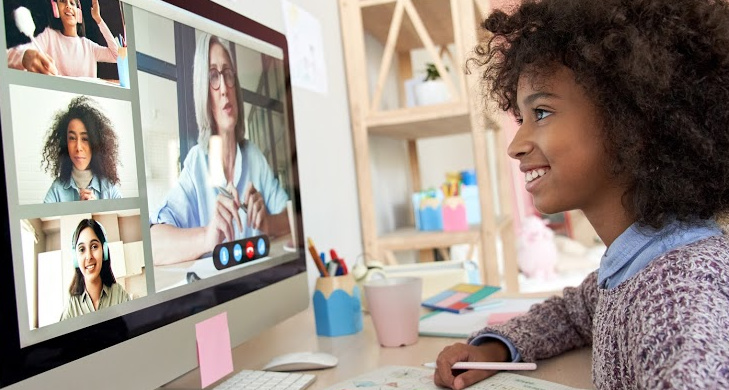According to Allison Miller, an experienced Learning Coach who worked with her own four children at home, there is one question that she always hears: “How do kids in online learning engage in socialization?” To answer this question, she digs deeper into the question of what socialization actually means When people hear the word “socialization,” they often think of large groups of kids who are meeting in-person.
However, she notes that this is a limited understanding, one that is actually deceptive. There are two dictionary definitions of “socialization” in the Oxford English Dictionary. The first is to interact socially with others, and the second is the process of learning to behave in a way that is acceptable to society. You’ll note that neither of these definitions say anything about interacting with one’s peers. In line with the second definition, socialization is an integral factor in learning to become a functioning member of society, and having children interact with their peers is one way of learning those skills. This means learning societal expectations to cultivate optimal interpersonal relationships to be successful both during school and in the years that follow graduation.
However, Miller challenges the assumption that a child’s peers are the most important social group that helps them learn social skills. The most influential group is actually the family. With that fact in mind, it makes sense that students who learn online with the support of their family gain just as many social skills as those in a traditional school.
What does the research say?
Studies show that students who learn in the home learn just as well in terms of their self-concept, self-esteem, and their ability to get along well in groups. There are also fewer behavioral issues. That’s because students at home look to their parents as role models rather than learning behaviors largely from their peers. Students learn more efficiently in an online community and can dedicate more time to their own personal interests.
Additionally, parents tend to socialize their kids “vertically,” meaning that they focus on things like community service and other factors that help cultivate emotional maturity. With fewer behavioral issues, parents who are in the role of Learning Coach can focus more on the social skills they know children will need as they venture into adulthood. They do not need to manage the behaviors of groups of 25-35 kids at once, which frees up more time to teach social skills.
How do we do it?
Learning Coaches have had to find ways to adapt, especially during some students’ abrupt transition to online learning last year. The key is finding age-appropriate opportunities. In the end, do what’s best for you and your child. Here are some ideas to help you.
- Class connects – Students will work with one another in classes. They can use breakout rooms or chat functions to connect with one another during class.
- School programming – Your individual school may offer in-person opportunities. Sometimes, families organize fieldtrips or in-person meetups. There are of course plenty of opportunities for online socialization as well.
- National programming – There are national clubs that can help students meet others who are all over the country. There are programs available through the National Park Service and arts programs that are available to anyone, regardless of where they live.
- Social media groups – You can connect online with other families and students in your own K12-powered school. Joining the social media group for your school is an important first step. This is the place where Learning Coaches provide ideas for one another and where families can connect with one another.
- Organized activities in local communities – Your child can participate in sports or other extracurricular activities through groups in the community. You may also be able to have your child participate in sports, art, or theater at their traditional schools as well.
- Community programming – Look to your local museum or botanical gardens. Remember that your student will learn social skills from any people they are interacting with; it does not need to be limited to their peers who they come into contact with at school.
- Rites of passage – Events like graduations and proms are memorable events that many students and families cherish. Thanks to some creativity and technology, students are still able to experience these important rites of passage.
The first step in providing socialization opportunities for your child is to challenge your understanding of the term, recognizing that there’s a lot more to it than the assumptions that may come to mind at first. Listen to the entire On Learning podcast to hear more ideas from Allison Miller.
This article was originally published in May 2021 and has been revised and republished in November 2021.




































